With all the calls for HR to be more strategic and more influential on the board, it’s sometimes easy to forget, that it’s a subset of HR people – employee relations (ER) professionals – that really make the day-to-day difference when it comes to impacting the employee experience.
ER professionals typically handle a wide range of employee issues – everything from staff time and attendance, to performance concerns, as well as more serious policy violations including allegations of harassment, discrimination and retaliation.
In fact data from HR Acuity suggests that over the past few years, the scope of employee relations has expanded and now routinely includes ER analytics (85%), proactive ER training (77%), policy development (68%), policy oversight (67%) and required employee training (66%).
But in a post-pandemic landscape, where hybrid working complicates the very essence of ‘employee relations’, have pressures/workload on ER professionals now magnified, and is it a cause for concern?
This was one of the questions HR Acuity asked when it was planning it’s recently published 6th ‘Employee Relations Benchmark Survey’ – the first since 2020.
Broadly, the results are to be expected. Employees increasingly expect, it finds, ER support when “moments that matter go wrong.” Moreover, it argues staff are increasingly “watching how investigations are run.” It adds: “They are noticing whether the outcomes are fair and equitable. They are talking about how their manager handled a bad situation. They are telling their friends and co-workers ‘what happens behind closed doors.” In other words, the spotlight on ER professionals has only intensified.
But what are the key take-outs?
To investigate in greater detail, and to chew over some the results, TLNT hooked up with HR Acuity’s CEO, Deb Muller, to find out exactly what some of the top trends were:
Key Findings
1) Transparency is falling
Fewer than 1 in 5 organizations (17%) share aggregated, anonymous investigation or employee relations data with employees. Of those that do, only half share it once a year.
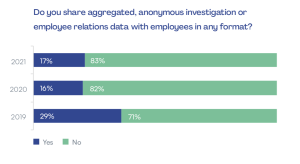
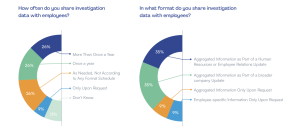
Muller says:
“This is a worry. Generally speaking, there is a willingness amongst ER professionals to be more transparent. But the reality is that we’re not seeing this – in fact the percentage sharing data has actually fallen from 29% in 2019. This is concerning, as more employers are also working with unions. Why this is happening is more complex. I think lots of companies are trying to work out what their new relationship is with employees, and I believe the data shows they are struggling with this. The data reveals that nearly 10% only share data when requested, and more do it only annually. This needs to change as employees demand that things are done properly.”
2) Caseloads are back down to pre-pandemic levels
The average ER professional has around 6-10 cases on the go at once.
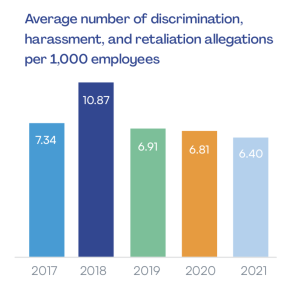
Muller says: “I’ve seen ER professionals do some really heroic work, and with case levels now back to pre-pandemic levels, I think the real challenge that lies ahead is for ER professionals to take some momentum forward. A worry is that we’re not seeing organisations really putting more resourcing into ER – be that from a technological point of view or training point of view [see below] – so unless these things change, there is a danger that some small gains in terms of ER having better visibility could fall flat.”
3) Training is not keeping pace
Organizations continue to train investigators less frequently than they did a few years ago. Similar to the 2020 findings, only 28% of organizations reported training investigators once a year or more. But two-thirds of organizations (65%) have no formal training for investigators or only provide investigation training on an as-needed basis, or less than every two years.
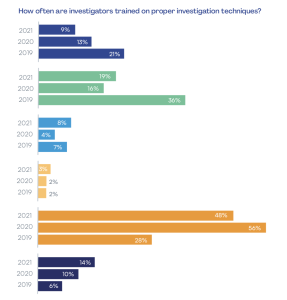
Muller says: “The fact that almost 50% of ER professionals say they receive training only as-and-when they need it is a worry. The concern is that doing an investigation can be vastly different from case to case, and what ER professionals really need for both transparency and accountability is consistency. The things ER now routinely look at require, we would argue, a more consistent and regulated approach to training. Employees don’t expect everything to go well, but when things go wrong, they expect it to be dealt with properly. We do now wonder whether ER professionals have the right skills to prepare themselves for the new post-pandemic landscape. Many younger workers won’t have dealt with unions before, for example, but now it’s essential they have a labor background, or training in labor relations.”
4) Data could be used better
Two-thirds of organizations reported they use metrics for data-driven insights and more than half use data to create and update policies. But there was an uptick in the number of organizations that gather data but don’t use it (to 19%).
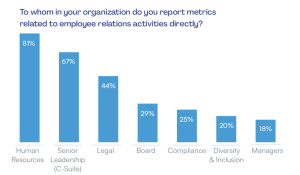
Muller says: “The good news is that ER is more centralized, and technology is widespread [some 92% of organizations now track their ER data]. But something we’re seeing is that ER professionals don’t get given the same data. It’s for managers to create better conditions for sharing – to arm ER professionals with what they need. We’re wanting to see much more of this.”
The outlook ahead:
Muller says: “When we started doing this research, we were interested in seeing how Covid-19 has impacted ER professionals. There are some worrying areas going forward. Transparency seems to have regressed a bit, and that is concerning. Better news is the fact that movements such as #MeToo, have enabled employees to feel like they can speak up on issues, and I think that in the coming years, employee voice, and employee activism will be the new normal. Where this could create problems though, is that if ER continues to not get the sorts of resources it needs, employees will become more vocal. We need to be up-skilling ER professionals and managers more.”
